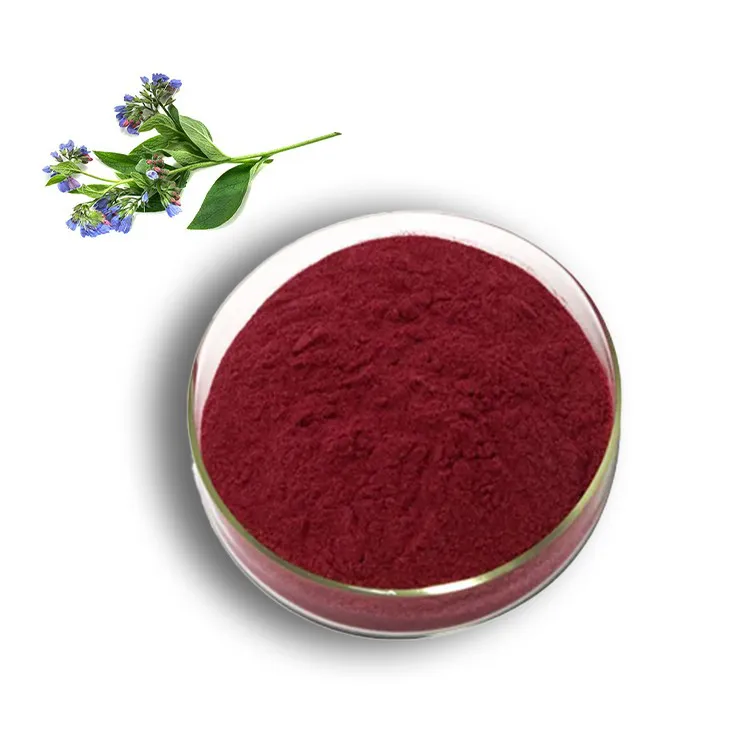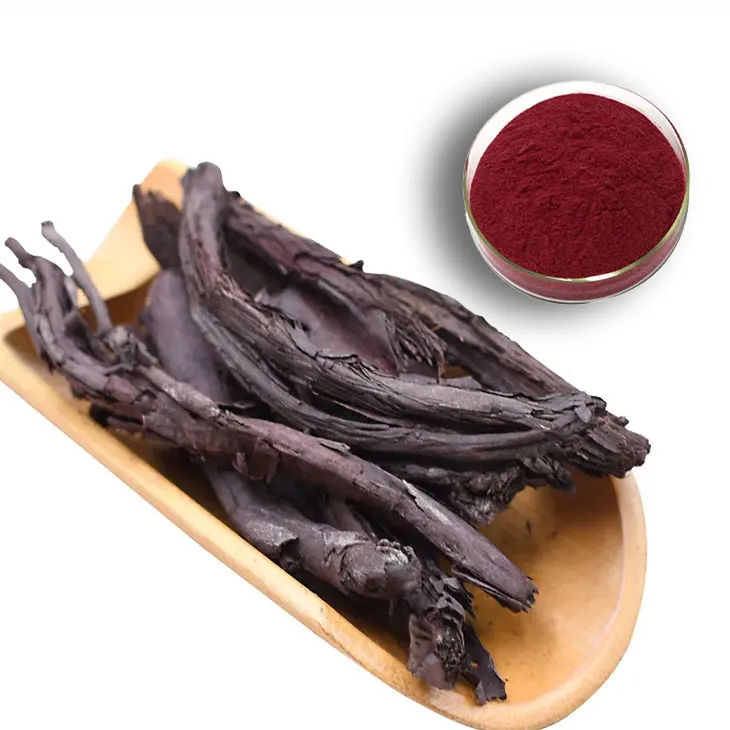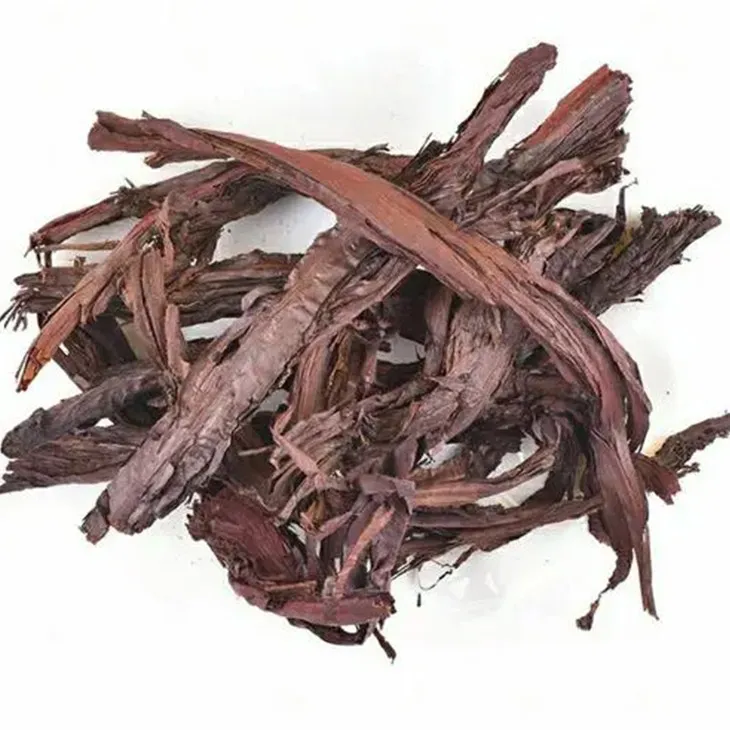- 0086-571-85302990
- sales@greenskybio.com
The Magic of Shikonin Powder: A Comprehensive Guide.
2024-11-12

1. Introduction
Shikonin powder has emerged as a substance of great interest in various fields, from medicine to cosmetics. It possesses a unique set of properties that give it a sort of "magic" quality. This comprehensive guide will take you on a journey to discover the secrets of Shikonin powder.

2. Chemical Composition
Shikonin is a naphthoquinone derivative. Its chemical structure is composed of a naphthalene ring with a quinone moiety. The precise chemical formula of shikonin is C16H16O5. This unique chemical structure is the basis for its many remarkable properties.
Shikonin powder may also contain other related compounds in minor amounts. These associated components can sometimes contribute to the overall activity of the powder. For example, some derivatives may enhance the antioxidant properties or have a role in its antimicrobial activities.

3. Biological Activities
3.1 Antimicrobial Activity
One of the most significant biological activities of shikonin powder is its antimicrobial effect. It has been shown to be effective against a wide range of bacteria, including both gram - positive and gram - negative bacteria. For instance, studies have demonstrated that shikonin can inhibit the growth of Staphylococcus aureus, a common gram - positive pathogen responsible for many infections in humans.
The antimicrobial mechanism of shikonin is complex. It is believed to disrupt the cell membrane of microorganisms, interfering with their normal physiological functions. This disruption can lead to leakage of cellular contents and ultimately cell death.
3.2 Antioxidant Activity
Shikonin powder also exhibits strong antioxidant properties. Oxidative stress is associated with numerous diseases and aging processes. Shikonin can scavenge free radicals, which are highly reactive molecules that can cause damage to cells and tissues.
The antioxidant activity of shikonin is attributed to its chemical structure. The naphthoquinone moiety can donate electrons to free radicals, thereby neutralizing them. This ability to combat oxidative stress makes shikonin powder a potential candidate for use in anti - aging products and in the prevention of oxidative - stress - related diseases.
3.3 Anti - inflammatory Activity
Inflammation is a natural response of the body to injury or infection, but chronic inflammation can lead to various health problems. Shikonin powder has been found to possess anti - inflammatory properties.
It can modulate the immune response and inhibit the production of inflammatory mediators such as cytokines. By reducing inflammation, shikonin may have potential applications in the treatment of inflammatory diseases like arthritis and dermatitis.

4. Scientific Research Findings
4.1 Cancer Research
In the field of cancer research, shikonin powder has shown promising results. It has been found to have cytotoxic effects on cancer cells. For example, in vitro studies have demonstrated that shikonin can induce apoptosis (programmed cell death) in certain types of cancer cells, such as breast cancer cells and leukemia cells.
The mechanism of its anti - cancer activity may involve interfering with the cell cycle of cancer cells, disrupting their normal growth and division processes. However, more in - vivo studies are needed to fully understand its potential as a cancer treatment.
4.2 Wound Healing
Research has also focused on the role of shikonin powder in wound healing. Shikonin has been shown to promote the proliferation of fibroblasts, which are cells involved in the production of collagen, an essential component for wound repair.
It can also enhance angiogenesis, the formation of new blood vessels in the wound area. These properties suggest that shikonin powder may be a useful ingredient in wound - healing formulations.
5. Practical Uses
5.1 In Medicine
Due to its antimicrobial, antioxidant, anti - inflammatory, and potential anti - cancer properties, shikonin powder has various medical applications.
- It can be used in the development of topical medications for skin infections, burns, and ulcers. For example, shikonin - based creams or ointments may help in treating fungal skin infections by taking advantage of its antimicrobial activity.
- As an antioxidant and anti - inflammatory agent, it may be incorporated into oral medications or supplements aimed at preventing or treating chronic diseases associated with oxidative stress and inflammation.
5.2 In Cosmetics
Shikonin powder is also finding its way into the cosmetics industry.
- Its antioxidant property makes it a desirable ingredient in anti - aging skincare products. It can help reduce the appearance of wrinkles and fine lines by combating free - radical damage.
- Shikonin's anti - inflammatory activity can also be beneficial for treating skin conditions such as acne and rosacea, leading to its inclusion in some facial creams and lotions.
5.3 In Food Industry
Although its use in the food industry is still in the early stages of exploration, shikonin powder has potential applications.
- As an antioxidant, it could be used as a natural preservative to extend the shelf life of food products, reducing the need for synthetic preservatives.
6. Production and Extraction
Shikonin powder is typically extracted from plants of the Boraginaceae family, such as Lithospermum erythrorhizon. The extraction process involves several steps.
- First, the plant material is harvested and dried. This step is crucial to ensure the stability of the compounds during the extraction process.
- Then, the dried plant material is subjected to solvent extraction. Commonly used solvents include ethanol, methanol, or ethyl acetate. The choice of solvent can affect the yield and purity of the shikonin extract.
- After extraction, the solvent is removed through evaporation or distillation, leaving behind a crude shikonin extract.
- Finally, further purification steps may be carried out to obtain high - purity shikonin powder. These purification steps can include chromatography techniques.
7. Safety and Precautions
While shikonin powder has many potential benefits, it is important to consider safety aspects.
Although generally considered safe in appropriate concentrations, high doses of shikonin may cause adverse effects. For example, in some animal studies, excessive intake of shikonin - containing substances has been associated with liver toxicity.
When using shikonin - based products, it is essential to follow the recommended dosages and usage instructions. Pregnant or breastfeeding women should exercise extra caution and consult a healthcare provider before using products containing shikonin.
8. Conclusion
Shikonin powder is truly a remarkable substance with a wide range of biological activities and practical uses. From its unique chemical composition to its potential applications in medicine, cosmetics, and the food industry, it has captured the attention of researchers and industry professionals alike.
However, more research is still needed to fully explore its potential and to ensure its safe and effective use. As our understanding of shikonin powder continues to grow, we can expect to see even more innovative applications in the future.
FAQ:
What is the chemical composition of shikonin powder?
Shikonin powder is mainly composed of shikonin and its derivatives. Shikonin has a naphthoquinone structure. It contains specific functional groups that contribute to its unique properties. These components play crucial roles in its biological activities and potential applications.
What are the main biological activities of shikonin powder?
Shikonin powder exhibits various biological activities. It has anti - inflammatory properties, which can help reduce inflammation in the body. It also shows anti - tumor activity, potentially inhibiting the growth of cancer cells. Additionally, it has antimicrobial effects, being able to combat certain bacteria, fungi, and viruses.
Why is shikonin powder becoming more popular?
The growing popularity of shikonin powder can be attributed to several factors. Firstly, its diverse biological activities make it a promising candidate in the fields of medicine and pharmaceuticals. Secondly, with the increasing interest in natural products, shikonin, as a natural compound, is attracting more attention. Moreover, research has been continuously uncovering new potential applications, which further drives its popularity.
What are the practical uses of shikonin powder?
Shikonin powder has practical uses in different areas. In medicine, it may be used in the development of new drugs for treating inflammatory diseases, cancer, or infections. In the cosmetic industry, it can be incorporated into products for its antioxidant and anti - inflammatory properties, such as in creams and lotions. It may also have potential applications in agriculture as a natural antimicrobial agent.
What are the latest scientific research findings on shikonin powder?
Recent scientific research on shikonin powder has revealed new insights. For example, studies have shown more detailed mechanisms of its anti - tumor activity, such as its influence on specific signaling pathways in cancer cells. There are also investigations into its potential in combination therapies, where it may work synergistically with other drugs. Additionally, research is exploring its role in tissue engineering and regenerative medicine.
Related literature
- Shikonin: A Review of Its Chemistry, Biological Activities, and Pharmaceutical Applications"
- "The Potential of Shikonin in Anti - Cancer Therapy: Current Research and Future Perspectives"
- "Shikonin as a Natural Antimicrobial Agent: Mechanisms and Applications"
- ▶ Hesperidin
- ▶ citrus bioflavonoids
- ▶ plant extract
- ▶ lycopene
- ▶ Diosmin
- ▶ Grape seed extract
- ▶ Sea buckthorn Juice Powder
- ▶ Beetroot powder
- ▶ Hops Extract
- ▶ Artichoke Extract
- ▶ Reishi mushroom extract
- ▶ Astaxanthin
- ▶ Green Tea Extract
- ▶ Curcumin Extract
- ▶ Horse Chestnut Extract
- ▶ Other Problems
- ▶ Boswellia Serrata Extract
- ▶ Resveratrol Extract
- ▶ Marigold Extract
- ▶ Grape Leaf Extract
- ▶ blog3
-
Cranberry Plants and Skin - care Products.
2024-11-12
-
Hedyotis Diffusa Extract
2024-11-12
-
Marigold Extract
2024-11-12
-
Aminolevulinic acid
2024-11-12
-
Genistein
2024-11-12
-
Passionflower Extract
2024-11-12
-
Konjac Powder
2024-11-12
-
Mulberry Extract
2024-11-12
-
Lemon Balm Extract
2024-11-12
-
Hops Extract
2024-11-12
-
Baicalin
2024-11-12





















